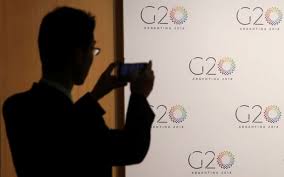China hopes U.S. shows sincerity at G20 trade talks

BEIJING/SHANGHAI (Reuters) – China hopes the United States can show sincerity and promote proposals both countries can accept when their two leaders meet at this week’s G20 summit, the Chinese Foreign Ministry said on Friday ahead of the key trade talks.
World leaders started arriving in Buenos Aires on Thursday ahead of the gathering of the Group of 20, where global trade tensions, fuelled by U.S. President Donald Trump’s trade war with China, are expected to dominate the agenda.
Financial and commodities markets are closely watching the outcome of the summit, especially a planned meeting between Trump and Chinese President Xi Jinping on Saturday, though the outcome is far from certain.
Just as he left for Argentina on Thursday, Trump sent mixed signals about the chances of a trade deal with China, saying an agreement was close but he was not sure he wanted one.
Asked how China viewed the prospects, Foreign Ministry spokesman Geng Shuang said China has consistently stressed that the essence of China-US trade is mutual benefit and win-win.
“At present both countries economic teams are maintaining close contact to put into effect the spirit of the consensus reached by the two leaders in their telephone call on Nov. 1,” Geng told a daily news briefing.
“We hope the U.S. can show sincerity and meet China half way, to promote a proposal that both countries can accept,” he added.
“At the same time we also hope that with the hard work of both sides, the Argentina meeting that will shortly take place between the leaders of China and the United States can achieve positive results, to set the direction for the next stage in the development of China-US ties.”
The rising tensions have seen the two countries hit each other with tit-for-tariffs on goods worth hundreds of billions of dollars in sectors from automobiles to agriculture and energy, stymieing trade and redrawing global supply chains.
The United States has levied additional duties of between 10 percent and 25 percent on $ 250 billion of Chinese goods this year as punishment for what it calls China’s unfair trade practices, with the 10 percent tariffs set to climb to 25 percent next year. China has responded with its own tariffs.
HITTING “PAUSE”
The state-run China Daily newspaper said in an editorial on Friday that an agreement can be reached in Argentina as both sides want a deal, but Washington must be “fair minded” if it wants to defuse spiralling tensions.
However, it said any deal at this stage was unlikely to be a comprehensive solution to the trade impasse due to “diverging demands and agendas”. It cited tensions over Chinese technological development, a focus of U.S. concern.
“However, it should be feasible for some kind of agreement to be reached to prevent the dispute worsening if both sides are reasonable,” it said.
A deal involving a total scrapping of all tariffs is not expected, although many observers have not ruled out a “pause” in the trade war where any planned tariff increases are put on hold while talks between the two sides continue.
The options for solving the Sino-U.S. problems are all on the table, a Chinese diplomat said in Washington on Wednesday, adding both sides have stepped up communication and he was optimistic about the Xi-Trump talks.
China’s commerce ministry said on Thursday it was also hoping for “positive results”.
Peter Navarro, a trade adviser to Trump who advocates a tough stance, will attend the meeting with Xi, a U.S. official told Reuters. Another official said Navarro’s addition was meant to send a message to China about the administration’s resolve.
The stakes are high for the world’s two biggest economies.
Official data on Friday showed that growth in China’s manufacturing sector stalled for the first time in more than two years in November, and new export orders declined for a sixth straight month.



